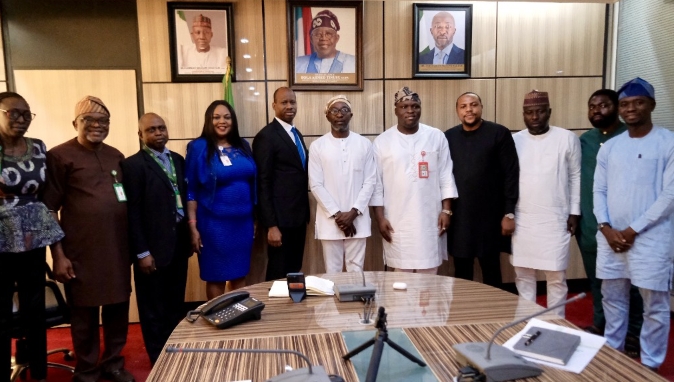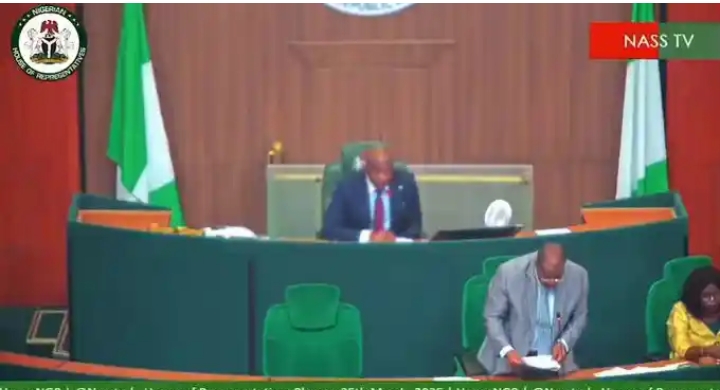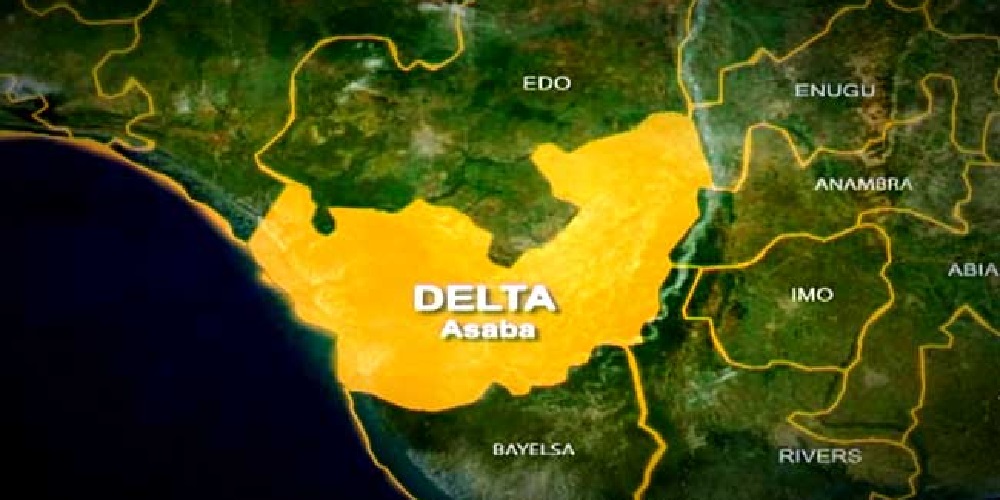News
NIMC cautions against unauthorized printing of NIN cards

The National Identity Management Commission(NIMC) has warned against indiscriminate printing of the National Identity Numbers (NIN).
NIMC, however, said in a statement by its Head of Corporate Communications, Kayode Adegoke, that it has” finalised plans to launch Improved General Multi-Purpose Card (GMPC), which is multifunctional and serves as a physical means of identification and payment.”
The commission added in the statement that it had noticed some unscrupulous individuals and business centres printing ‘NIN’ cards at ‘’exorbitant fees.’’
Stating that it authorised no one or organisation to print any card in place of the GMPC, NIMC warned that unauthorised issuance of its cards amounts to a breach of NIMC Act 23 of 2007.
The statement reads: “The general public and organisations are advised to stop printing any NIN cards against the authorised NIMC GMPC. The so-called NIN card is not authorised by NIMC, and on no account should anyone present it as a means of identification.
“The security agencies have been notified of this nefarious activity and have been mandated to apprehend those involved.
‘’Anyone caught will be made to face the full wrath of the law.
“The commission reiterates that the NIN slip is the only legal document authorised as a means of identification, and it must be verified upon presentation to access services. “
News
A trained workforce panacea for increased productivity – MD NSITF

By Kayode Sanni-Arewa
The Nigeria Social Insurance Trust Fund (NSITF), has identified a trained workforce as the panacea for increased productivity in the nation’s economy, and for rapid industrialization.
The Managing Director of NSITF, barrister Oluwaseun Faleye, while receiving the Senior Special Assistant to the President on industrial training and development, Adamson Olawatosin Ayide and his team on courtesy visit at Corporate headquarters of the Fund, buttressed the importances of a trained workforce in the country, saying ” It is the foundation for economic growth and sustainability in the country.”
Faleye, maintained that industrialization and manpower development efforts in Nigeria must be emphasized on the importance of a trained workforce.
According to him, increased productivity in the country and rapid industrialization resonates deeply on a trained workforce.
“In fact, it is indeed the foundation for economic growth and sustainability,” he also noted
Explaining further, the NSITF MD said ” A trained workforce is not just beneficial; it is essential.Through ongoing training, retraining, and skill development, we empower our people to earn a decent living. This responsibility falls on all of us, and those in leadership must be supported in these endeavours.”
Speaking on the benefits of a skilled workforce in the country and a proposed collaboration with the NSITF, Faleye posited ” This collaboration will facilitate mutual benefits across various sectors in Nigeria. The rationale for this partnership is evident by training individuals and equipping them with the necessary skills for gainful employment.
” NSITF can step into the process, provide support and services that benefit both workers and employers. Economic development is an interconnected responsibility that requires cooperation among various agencies and departments.
” We cannot operate in silos,our efforts must be aligned and amplified for maximum impact. l assure you that NSITF is prepared to commit both human and financial resources to the forthcoming national industrial manpower summit.”
To this end, he praised the SSA for his commitment to industrial development in the country, thanking Mr President for recognizing the importance of placing the right individuals in crucial roles.
He assured him of support from the Fund to ensure the success of the national industrial summit.
His words:” l appreciate your recognition of the collaborative nature of this endeavour. It is crucial that we work together across various agencies and departments to ensure that our initiatives are not only effective but also mutually beneficial.”
Earlier, in his address, the Senior Special Assistant industrial training and development, said “The mandate of my office is clear—to support Ministries, Departments, and Agencies (MDAs), as well as strategic private organizations, in the development of industrial manpower.
“In today’s rapidly evolving economic landscape, skills development is not just an option but a necessity for national progress. We believe that a robust, skilled workforce is the backbone of industrial growth, economic sustainability, and social stability.
“We recognize the critical role NSITF plays in protecting and empowering the Nigerian workforce. Your commitment to social security and employee welfare aligns with our vision for a skilled, protected, and productive labour force. It is for this reason that we seek to establish a strategic collaboration between our offices—one that will enhance skill acquisition efforts across industries, ensuring that Nigerian workers are not only well-trained but also well-supported”, he added.
News
Just in: Bill to Create Prime Minister’s Office Passes Second Reading

By Kayode Sanni-Arewa
A bill seeking to create the Office of the Prime Minister in Nigeria has passed its second reading in the House of Representatives. This proposed constitutional amendment aims to introduce a parliamentary-style governance structure, potentially altering Nigeria’s current presidential system.
Key Details of the Bill The bill, sponsored by key lawmakers, proposes the creation of a Prime Minister’s office, which would act as the head of government, while the President retains a ceremonial role as the head of state. If passed, Nigeria’s political system would move closer to a hybrid model, similar to those in France and India, where executive powers are shared between the President and Prime Minister.
Debate and Political Reactions The bill has sparked heated debates among lawmakers, political analysts, and the public: Supporters argue that a Prime Minister-led government would improve efficiency, accountability, and reduce executive overreach. Critics warn that it could lead to political instability, with frequent leadership changes based on parliamentary votes of confidence.
Opposition parties have also raised concerns that the move could be a political strategy to restructure power dynamics ahead of the 2027 elections.
What’s Next? With the bill now clearing the second reading, the next steps include: Committee Review: Further scrutiny and possible amendments. Third Reading & Final House Vote: If approved, it moves to the Senate for consideration. State Assembly Approval: A constitutional amendment requires ratification by at least two-thirds of Nigeria’s 36 states. If fully passed, Nigeria could see its most significant governance reform since the return to democracy in 1999.
Implications for Nigeria’s Future A shift to a Prime Minister-led system could: Decentralize executive power, making governance more collaborative. Change how elections are conducted, potentially giving more power to political parties rather than individual candidates. Impact economic and foreign policies, depending on the Prime Minister’s authority over ministries and agencies. As discussions continue, Nigerians will be watching closely to see whether this proposed change ushers in a new political era or deepens existing divisions.
News
Deputy Speaker Commends Role Of Media In Nigeria’s Democracy

By Gloria Ikibah
The Deputy Speaker, House of Representative, Rep. Benjamin Kalu has expressed deep appreciation to journalists covering legislative proceedings on their role in educating the public on the fundamentals of democracy.
Speaking to members of the House of Representatives Press Corps (HoRPC) at the National Assembly in Abuja, Kalu reflected on his past role as spokesperson, and stressed how necessary it is for legislators to engage with the media.
The Deputy Speaker recognised the difficult task journalists have to gor through in ensuring that Nigerians understand the fulcrum of democracy, especially as the system is still evolving.
He said: “It is one of the most difficult jobs to do because Nigeria is not used to this arm of government,” he stated.
Kalu recognised the the intentional efforts of the press in educating the masses.
According to him, the media’s persistent push has led to greater public understanding of how democracy functions and its role in advancing the nation.
“Your publications will not be forgotten”, Kalu said, even as he praised journalists for their role in nation-building.
“Your work is like laying bricks for the country’s development, encouraging them to continue writing despite the challenges they face”, he added.
The Deputy Speaker further reassured the media that their contributions to democracy will be remembered by posterity.
Speaking on Nigeria’s democratic journey, Kalu stated that while the nation is advancing, there is still much work to be done.
“We are not static.
“Once there is a movement, sometimes it will be fast, sometimes slow, but we are not static, and we keep moving until we get to our destination”, he said.
On the recent developments, including the establishment of development commissions across geopolitical zones, Kalu praised President Tinubu for approving these commissions, especially in the Southeast, where the said scars of war are still fresh.
Speaking further on legislative matters, Kalu addressed the National Assembly’s role in the review of the constitution, emphasizing the need for laws to evolve with society.
He therefore urged the media to help the public understand that proposals are not laws and that misinformation should be avoided. He also clarified the process of state creation and other parliamentary proposals, reassuring the public that such proposals are still under review and have not been enacted into law.
-

 News22 hours ago
News22 hours agoINEC in surprise backpedal, says petition to recall Senator Natasha now perfect
-

 News15 hours ago
News15 hours agoJUST-IN: Police Nab Niger Delta Congress President After Calls for Protest Against Emergency Rule
-

 News21 hours ago
News21 hours agoEid-el-Fitr: FG declares March 31, April 1 public holidays
-

 News16 hours ago
News16 hours agoHold Tight To One Wife – Emir Advises Muslim Men
-

 News16 hours ago
News16 hours agoPastor Adeboye Cries Out Against Using His Fake AI-Generated Content to Scam People (PHOTO)
-

 News16 hours ago
News16 hours agoLanding cost of petrol jumps to N885 per litre
-

 Metro22 hours ago
Metro22 hours agoKidnapped female land agent lifeless body found
-

 News9 hours ago
News9 hours agoPresident Tinubu To Mark 73rd Birthday With Special Prayer At Abuja Mosque -Spokesman






